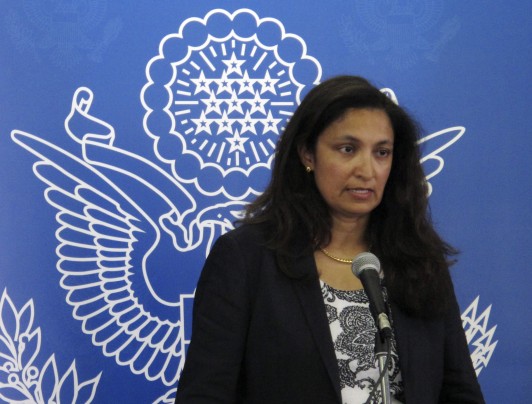BEIJING — U.S.
officials said Friday that human rights abuses in China are worsening and
that their latest talks with the Chinese government on the issue "fell short
of expectations."
Of particular concern,
U.S. diplomats said, are the growing number of instances of officials
targeting the families and lawyers of human rights activists to try to
silence them.
"This is a worrisome
trend and one we’ve raised at senior levels of the Chinese government," said
Uzra Zeya, the U.S. acting assistant secretary of state for democracy, human
rights and labor. During a news conference in Beijing, she described such
actions as "extralegal punishment and measures that are inconsistent with
China’s own laws."
During this week’s
annual U.S.-China meeting, Zeya said, she and other U.S. officials raised a
long list of concerns, including worsening persecution of ethnic and
religious minorities, journalists and online activists, as well as
restrictions on universal freedoms and lack of rule of law.
It has become
increasingly difficult in recent years to engage China on human rights,
according to U.S., Chinese and international human rights activists. As the
country’s global power has expanded, its government has become more
assertive about pressuring foreign governments, businesses, organizations
and journalists not to bring up issues such as human rights, which Chinese
officials see as both potentially embarrassing and no one else’s business.
China has long
dismissed U.S. criticism on human rights as biased and unfounded. Of late,
it has started releasing its own report of alleged U.S. human rights abuses
on the same day in spring that the State Department publishes its annual
worldwide rights survey. In this year’s version in April, Chinese officials
cited U.S. failures to protect its citizens from gun violence, surveillance
practices and military actions as human rights violations.
In describing China’s
recent and increasing harassment of activists’ families, U.S. officials said
they raised the examples of imprisoned Nobel Peace Prize winner Liu Xiaobo,
whose wife has been under house arrest and whose brother was recently
sentenced to prison, and blind lawyer Chen Guangcheng, whose nephew has been
imprisoned while other relatives have found their
home frequently under attack.
At the meeting in the
southern city of Kunming, U.S. officials said, they also brought up several
specific cases of well-known dissidents who are believed to be imprisoned by
the government, including human rights lawyer Gao Zhisheng and
anti-corruption activist Xu Zhiyong. His
arrest last month prompted open letters of protest by liberal
intellectuals in China.
Other cases
specifically discussed were those of Tibetan documentary filmmaker Dhondup
Wangchen, government petitioner Ni Yulan, Mongolian dissident Hada and
Uighur journalist Gheyret Niyaz.
"In some cases, we
were able to receive some information, but I would say overall it fell short
of our expectations," Zeya said, declining to go into specifics of the
discussion.
Some activists
expressed concern that the annual meetings on human rights the United States
and European Union have set up with China could prompt Beijing to limit
discussion of rights abuses to those particular talks, keeping the issue
from bleeding into other arenas of dialogue between higher-level officials.
"While the U.S.
government goes into it to raise issues and make progress and to some extent
demonstrate it is doing something on human rights, the Chinese have the
exclusive goal of limiting U.S. intervention on human rights issues," said
Sophie Richardson of New York-based Human Rights Watch. "Their hope is that
this is the one time of the year to raise this issue up and it’s not to be
brought up otherwise."
Responding to those
concerns, Zeya said it is "critically important that this is not a
once-a-year exercise but that it’s an issue that’s raised continually in our
engagement with Chinese government."
She noted that
Secretary of State John F. Kerry and President Obama have brought up the
subject at recent meetings.






 Beyond
Great Walls: Environment, Identity, and Development on the Chinese
Grasslands of Inner Mongolia
Beyond
Great Walls: Environment, Identity, and Development on the Chinese
Grasslands of Inner Mongolia China's
Pastoral Region: Sheep and Wool, Minority Nationalities, Rangeland
Degradation and Sustainable Development
China's
Pastoral Region: Sheep and Wool, Minority Nationalities, Rangeland
Degradation and Sustainable Development The
Ordos Plateau of China: An Endangered Environment (Unu Studies on
Critical Environmental Regions)
The
Ordos Plateau of China: An Endangered Environment (Unu Studies on
Critical Environmental Regions)